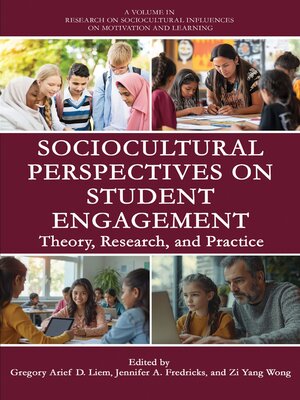Sociocultural Perspectives on Student Engagement
ebook ∣ Theory, Research, and Practice · Research on Sociocultural Influences on Motivation and Learning
By Gregory Arief D. Liem

Sign up to save your library
With an OverDrive account, you can save your favorite libraries for at-a-glance information about availability. Find out more about OverDrive accounts.
Find this title in Libby, the library reading app by OverDrive.



Search for a digital library with this title
Title found at these libraries:
| Library Name | Distance |
|---|---|
| Loading... |
The concepts of student motivation and student engagement have emerged from related but distinct fields of study. Contemporary scholars suggest that student engagement is shaped by various sociocultural, contextual, and personal factors (including motivation), and that it serves as a pathway to various positive student outcomes (e.g., academic achievement, well-being). Given its significance, there is growing global interest among researchers, policymakers, and practitioners (teachers, interventionists, parents) in understanding how engagement can be promoted in schools, at home, or in other settings. That said, much of the research on student engagement has been conducted in WEIRD (Western, Educated, Industrialized, Rich and Democratic) contexts, leaving us with limited knowledge about generalizability of extant student engagement models on students from non-WEIRD backgrounds.
To address this gap, we invited experts in various areas of student engagement to critically examine their theoretical and empirical works through a sociocultural lens and consider the implications for future research and practice. Contributors of this volume have offered novel models for understanding how sociocultural contexts and backgrounds (e.g., ethnicity, socioeconomic status, immigrant status, relationships) and socioculturally learned attributes (e.g., cultural beliefs, values, and practices) shape student engagement in different settings (e.g., online, classroom, out-of-school time programs). Additionally, they provided insights on practical and methodological issues that both researchers and practitioners should be mindful of. This volume highlights the need to critically consider both the cultural specificity and universality of student engagement processes and discusses ways to promote engagement across diverse sociocultural contexts and student populations.







